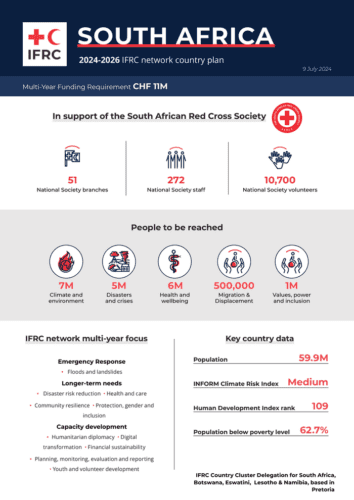Attachments
IFRC NETWORK ACTION
JOINT SITUATIONAL ANALYSIS
South Africa is grappling with a growing crisis driven by the adverse effects of climate change, which has exposed vulnerable populations and communities to a range of severe hazards, including floods, cyclones, prolonged droughts and uncontrollable fires. These climate-related challenges have resulted in significant human displacement, posing a pressing concern for the nation.
Recent occurrences highlighted the urgency of the situation. Between July 2023, and September 2023, South Africa experienced a surge in uncontrolled fires in peri-urban and urban settings, notably affecting informal settlements in KwaZulu Natal and Gauteng. Of significant concern is the devastating Kennedy Road informal settlement fire in Durban, KwaZulu Natal, which left thousands of individuals displaced and in dire need of assistance and support. Furthermore, Johannesburg Central Business District experienced a
devastating fire on August 31, 2023, resulting in the tragic loss of lives, damage to personal belongings, and the destruction of critical infrastructure.
In addition to the fire incidents, several South African provinces, including parts of KwaZulu Natal, Eastern Cape, Northern Cape, and Western Cape, have been grappling with the consequences of severe rainfall. These heavy rains have led to a decline in food security and have negatively impacted livelihoods. The implications extend beyond immediate material losses, posing a substantial threat to South Africa’s social cohesion, water resources, food security, livelihoods, health and critical infrastructure. Importantly, the changing weather patterns linked to these challenges have amplified gender-specific vulnerabilities within affected communities.
South Africa currently faces a convergence of complex challenges spanning political, social, demographic and economic dimensions, reflecting a critical juncture in the nation’s history. Politically, the country is grappling with heightened social unrest and protests. These incidents often involve tensions between local citizens and foreign nationals, occasionally escalating to hostile takeovers of settlements and mining towns. The root causes are multifaceted, with a prominent factor being the economic hardships faced by the citizens coupled with elevated rates of youth unemployment.
A notable development is the emergence of mobilization groups like ‘Operation Dudula’, which have targeted undocumented foreign nationals across South Africa. This has exacerbated social instability, particularly in regions primarily situated in Gauteng townships and peri-urban settings, namely Alexandra, Diepsloot, Johannesburg and Soweto. These areas have witnessed incidents of social unrest directly linked to the activities of ‘Operation Dudula’. Consequently, migrant communities have occasionally hesitated to seek refuge in community shelters, as observed during recent floods in KwaZulu Natal. The prevailing situation underscores the imperative for a comprehensive and harmonized approach to migration, protection and management policies.
Environmental challenges further compound the nation’s difficulties, with ongoing floods affecting regions such as Western Cape, KwaZulu Natal, and Northern Cape. These natural disasters continue to jeopardize human lives and exacerbate food insecurity. Parts of Eastern Cape have witnessed a surge in cases of malnutrition, particularly among rural communities and children. Tragically, malnutrition has emerged as a leading cause of death among young children.
These interwoven challenges underscore the intricacy of South Africa’s current socio-political landscape. Effective responses will necessitate not only a unified domestic approach but also international collaboration and support to address these pressing issues and foster stability, security and prosperity for all South Africans.
Source link : https://reliefweb.int/report/south-africa/south-africa-2024-2026-ifrc-network-country-plan
Author :
Publish date : 2024-07-09 16:45:18
Copyright for syndicated content belongs to the linked Source.
